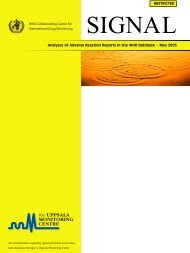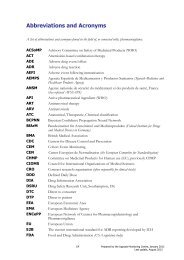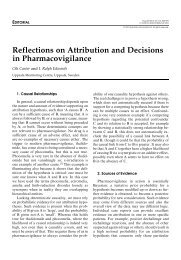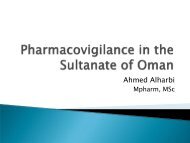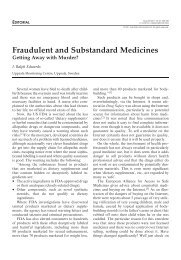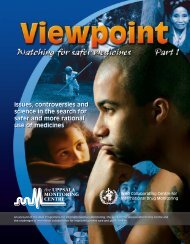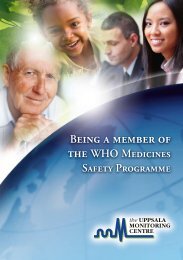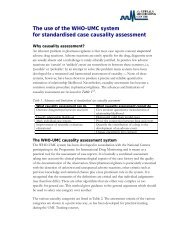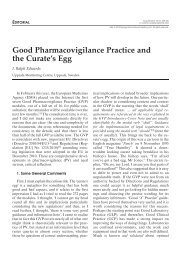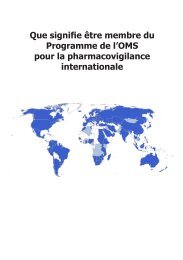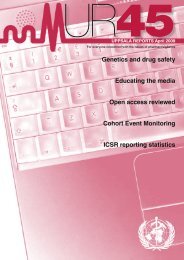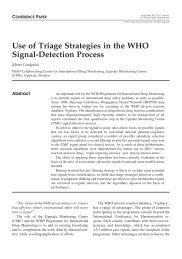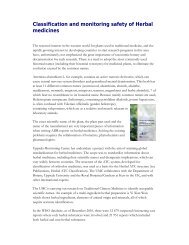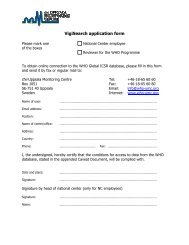UMChttp://www.who-umc.org/DynPage.aspx?id=14292Page 4 of 82010-06-23The national pharmacovigilance centre, under the direction of Dr António Faria Vaz, recentlyinvestigated the situation for pharmacovigilance in Portugal by 1) interviewing former staffmembers 2) interviewing opinion leaders in the pharmaceutical industry, members of themedical and pharmaceutical professions and their respective associations 3) analysingstandard operating procedures in pharmacovigilance 4) evaluating available adversereaction dataThe following main obstacles to development of pharmacovigilance in the country wereidentified:• lack of technical and scientific resources• lack of information about the reporting system• excessive centralization• lack of reporting culture• lack of research in the areaAn action plan to be carried out 1997-99 has been elaborated. The following elements areincluded1. Creation of local reference centres located in universities and/or teaching hospitals2. Dissemination of information about the national pharmacovigilance system to all healthauthorities and hospital boards. Meetings with directors of hospital and clinics will beorganized in all parts of the country3. Creation of a pharmacovigilance bulletin to be sent to all doctors and pharmacists fourtimes a year4. A national campaign to promote adverse reaction reporting will be launched throughspecialized media, organized by a marketing company5. Training courses on adverse drug reactions for hospital doctors and GPs will take place incollaboration with university pharmacology departments and the local reference centres6. Establishment of a research promotion fundFor further information about the project, please contact Dr António Faria Vaz, phone +351-1-7908558, fax +351-1-7959116, e-mail: infarmed@mail.telepac.ptThe 21 st Annual Meeting of National <strong>Centre</strong>s Participating in the WHO Programmefor International Drug <strong>Monitoring</strong>This meeting will be organized by the Ministry of Health, Japan, 8 - 11 September, <strong>1998</strong>.Invitations are expected to be distributed soon from WHO headquarters, Geneva.Recent publications from the UMC1. I.Ralph Edwards, Who cares about pharmacovigilance? European Journal of ClinicalPharmacology (1997) 53:83-882. M.M.S. Stahl, M. Lindquist, M. Pettersson, I.R. Edwards, J.H. Sanderson, N.F.A. Taylor,A.P. Fletcher, J.S. Schou, Withdrawal reactions with selective serotonin re-uptake inhibitorsas reported to the WHO system. European Journal of Clinical Pharmacology (1997) 53:163-1693. R.H.B. Meyboom, A.C.G. Egberts, I.R. Edwards, Y.A. Hekster, F.H.P. de Koning, W.J.Gribnau, Principles of Signal Detection in Pharmacovigilance. Drug Safety (1997) 16:355-3653. I.R. Edwards, B. Hugman, The Challenge of Effectively Communicating Risk-BenefitInformation, Drug Safety (1997) 17:216-2274. R.H.B. Meyboom, Y.A. Hekster, A.C.G. Egberts, F.W.J. Gribnau, I.R. Edwards, Causal orCasual? The Role of Causality Assessment in Pharmacovigilance. Drug Safety (1997)17:374-3895. A.Bate, M. Lindquist, I.R. Edwards, S. Olsson, R. Orre, A. Lansner, R.M. de Freitas, ABayesian neural network method for adverse drug reaction signal generation. EuropeanJournal of Clinical Pharmacology (in press)6. S. Olsson, Role of WHO Programme on International Drug <strong>Monitoring</strong> in Co-ordinatingWorldwide Drug Safety Efforts. Drug Safety (in press)Favourable offer for ADR software
UMChttp://www.who-umc.org/DynPage.aspx?id=14292Page 5 of 82010-06-23One of our duties is to support the development of national systems for collection of drugsafety information. The lack of adequate off-the-shelf computer software at affordableprices to support the work of pharmacovigilance centres has been a major obstacle to theestablishment and development of such centres in less resourceful countries. To remedythe situation we have, in a joint project with our computer service company PharmaSoft,developed a software with all functions needed to support a small or middle sized nationaldrug monitoring centre. The computer programme also allows convenient reporting to theWHO data base. This software, called PS Drug Watch, is now offered to nationalpharmacovigilance centres in a one-PC-version at the favourable price of USD1500.In connection with this offer, PharmaSoft is also presenting a stand-alone version of theircomprehensive product information system, developed to support all activities involved inthe drug registration process, for drug regulatory authorities. This product, PS Regulator-Light, is offered at the same favourable price of USD1500.Further information about the products may be received from Sten Olsson at UMC or SvenG.Johansson at PharmaSoft, phone +46-18-185400, fax +46-18-109200ObituariesProfessor emeritus Garth McQueen died in his home in Dunedin, New Zealand in June,1997. Garth was a great man, having scholarship, vision and integrity. He and a few otherswith international vision started work in drug and chemical safety that has helped to makethe world a safer place. The linking of drug with chemical safety in general and service andresearch functions has become the recommended approach of the World HealthOrganisation, and New Zealand was the pioneer of this approach.The Intensive Medicines <strong>Monitoring</strong> Programme is another unique drug safety developmentthat started through Garth's work, and is still admired worldwide.Prof. Garth McQueen was one of the first clinical toxicologists, using his general medicaland clinical pharmacological knowledge to great effect. He was a person with a profoundinterest in his work, and initiated what was to become the National Toxicology Group inNew Zealand, and the Intensive Medicines <strong>Monitoring</strong> Programme for prescription eventmonitoring.Both other specialists and students held Garth in great regard for his clinical knowledge andwisdom. He was a good teacher and the sometimes stern exterior was frequently enlivenedby original humour. But he did not suffer fools gladly, and was not afraid to stand againstthe flow for what he thought was right.He was very active in WHO circles and New Zealand was one of the original countriesinvolved in the WHO Programme for International Drug <strong>Monitoring</strong>.The fact that he learned to ski when he was about 60 perhaps gives some impression of thedetermined person he was!Dr Franz Rosa, who served as an epidemiologist and teratologist for the FDA in UnitedStates 1979 - 1996 died from cancer on 3 October, 1997. Dr Rosa was for many years anactive and much valued signal reviewer in the teratology area for the WHO Drug <strong>Monitoring</strong>Programme. A Franz Rosa Scholarship Fund has been established by the Organization ofTeratology Information Services in the US.Product newsComputerized WHO Adverse Reaction Terminology (WHOART) and WHO Drug DictionaryNew updated versions containing information up to and including the fourth quarter 1997will be available at the end February/beginning of <strong>March</strong>.The English version of WHOART, December 31, 1997, will be available in hard copy in<strong>March</strong>/April.ART Access, the computerized ART with search facilities, will be updated to includeinformation as per the fourth quarter 1997. It will be available during <strong>March</strong>..The hard copy version of WHO Drug Dictionary <strong>March</strong> 31, <strong>1998</strong>, as well as the DD Access,standard version, will be available in June.The <strong>Centre</strong> will attend the following meetings during the next few months and exhibit itsproducts: <strong>March</strong> 30 - April 1: DIA 10th Annual EuroMeeting, Nice, France April 22 - 24:ACRP's 22nd Annual Meeting, Anaheim (CA), USA May 13 - 15: IIR's Adverse Drug Reaction



